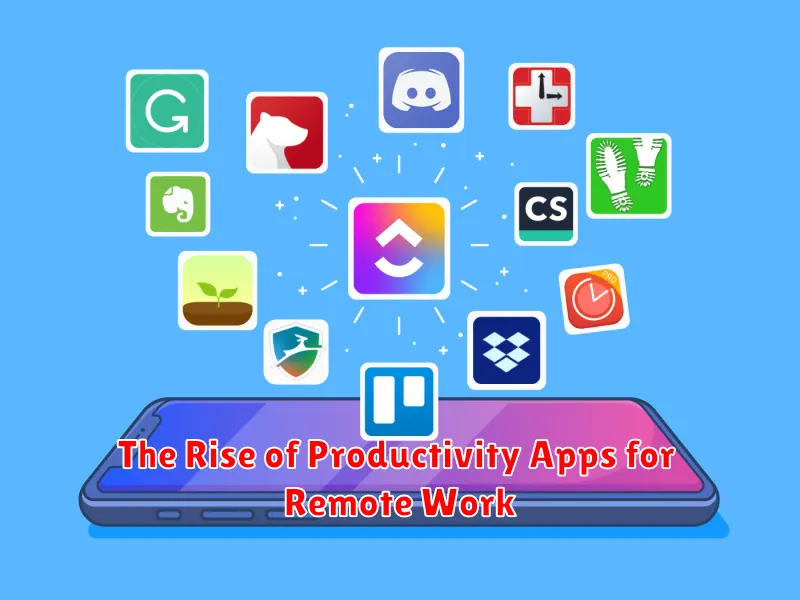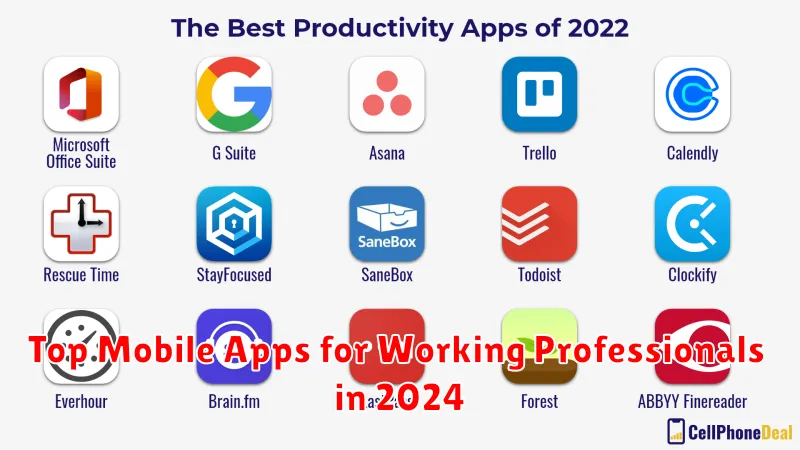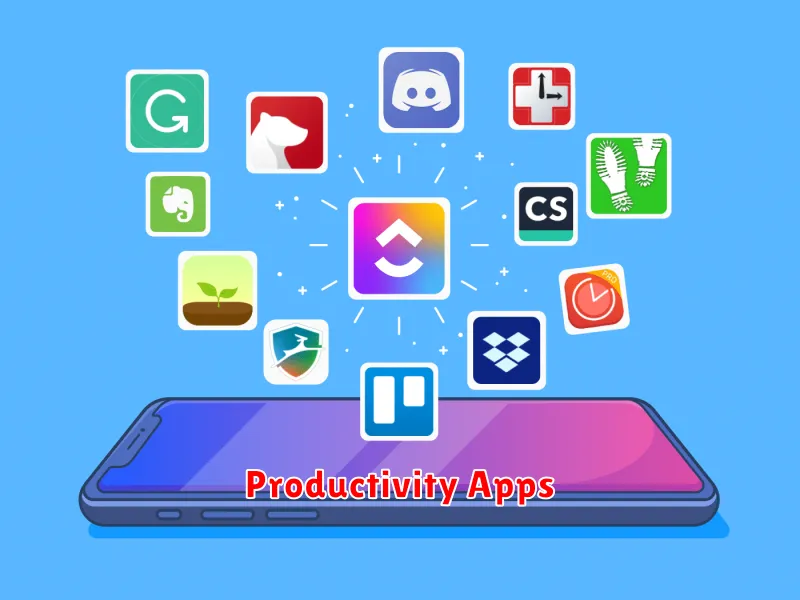The way we work has undergone a significant transformation in recent years, driven by the rise of mobile technology. Mobile apps have become indispensable tools for professionals across industries, revolutionizing the way we communicate, collaborate, and manage our tasks. From project management and communication to data analysis and productivity enhancement, mobile apps are empowering us to work smarter, faster, and more efficiently than ever before.
This article will explore the profound impact of mobile apps on the modern workplace. We will delve into the key features and benefits of work-related mobile applications, examining how they are transforming various aspects of our work lives. We will also discuss the challenges and opportunities presented by this mobile revolution, providing insights into the future of work in the age of mobile apps.
The Rise of Productivity Apps for Remote Work

The rise of remote work has led to a surge in demand for productivity apps. These apps provide essential tools for managing tasks, collaborating with colleagues, and staying organized, all while working from anywhere. Whether it’s project management platforms, communication tools, or time-tracking apps, these mobile applications have become indispensable for remote teams.
Project management apps like Asana, Trello, and Monday.com enable teams to create and manage tasks, set deadlines, and track progress. These platforms provide a centralized hub for all project-related activities, ensuring everyone is on the same page and working towards the same goals.
Communication tools like Slack, Microsoft Teams, and Zoom have become the lifelines for remote teams. These apps facilitate instant messaging, video conferencing, and file sharing, allowing seamless communication and collaboration. They foster a sense of connection and teamwork despite physical distance.
Time-tracking apps like Toggl Track and Clockify help remote workers manage their time effectively. These apps record the time spent on specific tasks, providing valuable insights into productivity levels and identifying potential areas for improvement. They promote accountability and ensure that work hours are utilized efficiently.
The availability of such productivity apps has revolutionized the way we work. They have empowered remote teams to be more efficient, organized, and connected, enabling them to thrive in a distributed work environment. As the demand for remote work continues to grow, so too will the importance of these apps in shaping the future of work.
How Mobile Apps Enhance Team Collaboration
In today’s fast-paced work environment, teams need to be able to collaborate effectively, regardless of location. Mobile apps are playing an increasingly important role in enabling this. They provide a range of features that facilitate seamless communication, task management, and information sharing, enhancing team collaboration and productivity.
One of the key ways mobile apps improve team collaboration is through real-time communication. Apps like Slack, Microsoft Teams, and Google Chat allow team members to instantly message each other, share files, and participate in group discussions. This helps to eliminate communication silos and ensures everyone is on the same page.
Mobile apps also enable efficient task management. Tools like Trello, Asana, and Monday.com allow teams to create, assign, and track tasks, set deadlines, and monitor progress. This centralized platform helps to keep everyone organized and accountable, improving workflow efficiency.
Moreover, mobile apps facilitate easy access to information. Team members can access important documents, presentations, and project updates from anywhere, anytime. Cloud-based storage and collaboration platforms like Google Drive and Dropbox make it simple to share files and work on documents simultaneously.
Finally, mobile apps promote greater team engagement. By providing a platform for communication, collaboration, and information sharing, these apps create a more connected and engaged team. This can lead to improved morale, increased productivity, and better decision-making.
Security Concerns with Work-Related Mobile Apps
While mobile apps offer numerous benefits for work, they also present significant security risks that businesses and employees must be aware of. These apps often handle sensitive data, including customer information, financial records, and proprietary intellectual property. Data breaches through these apps can have serious consequences, including financial losses, reputational damage, and legal ramifications.
One major concern is unauthorized access to company data. Mobile devices are easily lost or stolen, and if they contain work-related apps, the data they hold could fall into the wrong hands. Additionally, malicious apps can be downloaded onto devices and used to steal data or install malware. It is also essential to be aware of the security measures implemented by the app developers, as some may not adequately protect user data.
Another security concern is the potential for data leaks. Mobile apps often collect and store user data, which can be vulnerable to hacking or data breaches. This data could include sensitive information such as passwords, financial details, or location data. Businesses must ensure that the apps they use have strong security measures in place to protect this data.
Finally, there are concerns regarding compliance with data privacy regulations. Many countries have strict laws regarding the collection, storage, and use of personal data. Businesses must ensure that the mobile apps they use comply with these regulations to avoid legal penalties and protect user privacy.
To mitigate these security risks, businesses should implement comprehensive security policies that address the use of mobile apps in the workplace. This includes using secure devices, implementing strong authentication mechanisms, and training employees on best practices for mobile app security. By taking these steps, businesses can help ensure that their data remains secure and their operations remain uninterrupted.
The Role of AI in Enhancing Workplace Apps
Artificial intelligence (AI) is rapidly changing the way we work, and mobile apps are at the forefront of this transformation. AI-powered features are enhancing workplace apps in a variety of ways, making them more efficient, personalized, and user-friendly.
One of the most significant ways AI is impacting workplace apps is through automation. AI can automate repetitive tasks, such as scheduling meetings, managing emails, and generating reports, freeing up employees to focus on more strategic work. This can lead to significant increases in productivity and efficiency.
Another key area where AI is making a difference is in personalization. AI-powered apps can learn user preferences and provide tailored recommendations and insights. This can be useful for everything from suggesting relevant documents to recommending training courses.
AI is also playing a crucial role in improving user experience. AI-powered chatbots can provide instant support and answer questions, while voice recognition technology can make it easier for users to interact with apps.
As AI continues to evolve, we can expect to see even more innovative ways that it enhances workplace apps. From predictive analytics to sentiment analysis, AI has the potential to revolutionize the way we work and make our jobs more enjoyable and fulfilling.
Top Mobile Apps for Working Professionals in 2024

The world of work is rapidly evolving, and mobile apps are at the forefront of this transformation. With the rise of remote work and the increasing demand for flexibility, mobile apps have become indispensable tools for working professionals. Here are some of the top mobile apps that are helping professionals stay organized, productive, and connected in 2024:
1. Slack: This popular messaging and collaboration platform allows teams to communicate effectively, share files, and work together seamlessly, regardless of their location. Slack’s mobile app offers real-time notifications, direct messaging, and channel-based communication, making it easy to stay on top of work even when on the go.
2. Microsoft Teams: Another powerful collaboration tool, Microsoft Teams integrates seamlessly with other Microsoft Office apps, such as Word, Excel, and PowerPoint. Its mobile app enables video conferencing, file sharing, and task management, allowing teams to work together efficiently from anywhere.
3. Asana: Asana is a project management app that helps professionals organize their tasks, track progress, and collaborate with team members. Its mobile app offers a user-friendly interface, allowing users to create and manage projects, assign tasks, and set deadlines, all from their smartphones.
4. Trello: Trello is a visual project management tool that utilizes a Kanban-style workflow. Its mobile app allows users to create boards, lists, and cards to organize their tasks and projects. Trello’s intuitive interface and flexibility make it an excellent choice for managing both personal and professional projects.
5. Google Calendar: This calendar app from Google is a must-have for any working professional. Its mobile app allows users to schedule appointments, set reminders, and manage their time effectively. Google Calendar seamlessly integrates with other Google services, making it easy to stay organized and on top of your schedule.
6. Evernote: Evernote is a powerful note-taking app that allows users to capture ideas, create notes, and organize information. Its mobile app offers a variety of features, including note syncing, voice recording, and web clipping, making it a valuable tool for capturing thoughts and ideas on the go.
7. Zoom: Zoom is a popular video conferencing app that enables users to conduct virtual meetings, webinars, and online events. Its mobile app allows users to join meetings, share screens, and participate in discussions, making it easy to collaborate with colleagues and clients remotely.
8. LinkedIn: LinkedIn is the world’s largest professional networking platform. Its mobile app allows users to connect with other professionals, search for jobs, and stay updated on industry trends. LinkedIn is a valuable tool for building your professional network and advancing your career.
These mobile apps are just a few examples of the many tools available to help working professionals stay productive, organized, and connected in today’s fast-paced world. By leveraging the power of these apps, professionals can work smarter, not harder, and achieve greater success in their careers.
The Future of Mobile Apps in the Workplace
The way we work is rapidly changing, and mobile apps are at the forefront of this transformation. As technology advances and the workforce becomes increasingly mobile, mobile apps are becoming essential tools for businesses of all sizes. From communication and collaboration to task management and employee training, mobile apps are revolutionizing the way we work.
The future of mobile apps in the workplace is bright, with new and innovative apps constantly emerging to meet the evolving needs of businesses. Here are some key trends shaping the future of mobile apps in the workplace:
- Increased Personalization: Mobile apps will become more personalized to meet the unique needs of individual employees and teams. This will include features like customized dashboards, tailored content, and personalized recommendations.
- Enhanced Security: As more sensitive data is accessed through mobile devices, security will be a top priority. Mobile apps will incorporate advanced security features like multi-factor authentication, biometrics, and encryption to protect data from unauthorized access.
- Integration with Emerging Technologies: Mobile apps will integrate seamlessly with emerging technologies like artificial intelligence (AI), augmented reality (AR), and the Internet of Things (IoT). This will enable new capabilities like automated task management, real-time data analysis, and remote control of physical assets.
- Improved User Experience: Mobile apps will continue to evolve to offer a more intuitive and engaging user experience. This will include features like voice-activated commands, gesture recognition, and gamification to make work more enjoyable and productive.
As mobile apps continue to evolve, they will play an increasingly vital role in shaping the future of work. Businesses that embrace mobile apps will be well-positioned to adapt to the changing workplace and gain a competitive edge. The future of mobile apps in the workplace is exciting, and it’s only just beginning.

